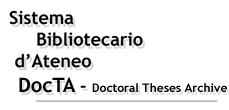|
|
DocTA - Doctoral Theses Archive >
Tesi di dottorato >
CORSO DI DOTTORATO IN SISTEMA AGRO-ALIMENTARE >
Citazione:
Utilizza queste indicazioni per citare o creare un link a questo documento.
|
Uleri, Francesca. "AGRO-EXPORT AND LATIN AMERICAN AGRARIAN CHANGES: A SOCIOLOGICAL ANALYSIS OF THE EVOLUTION OF THE PEASANT ECONOMY UNDER THE COMMODITIZATION OF QUINOA IN THE BOLIVIAN SOUTHERN HIGHLANDS. EFFECTS ON LAND, LABOUR AND FOOD SECURITY", Università Cattolica del Sacro Cuore, XXXII ciclo, a.a. 2018/19, Piacenza, [http://hdl.handle.net/10280/72837].
|
| Titolo: | AGRO-EXPORT AND LATIN AMERICAN AGRARIAN CHANGES: A SOCIOLOGICAL ANALYSIS OF THE EVOLUTION OF THE PEASANT ECONOMY UNDER THE COMMODITIZATION OF QUINOA IN THE BOLIVIAN SOUTHERN HIGHLANDS. EFFECTS ON LAND, LABOUR AND FOOD SECURITY |
| Autore/i: | ULERI, FRANCESCA |
| Tutor: | VENDRAMINI, EMANUELE ANTONIO
PIVA, MARIACRISTINA |
| Coordinatore: | TREVISAN, MARCO |
| Lingua: | ENG |
| Abstract in italiano della tesi: | Dagli anni '80 lo sviluppo del sistema agro-alimentare globale ha subito un processo di progressiva globalizzazione che ha interessato sia il complesso della produzione che i modelli di consumo. Questa tendenza ha innanzitutto portato a una crescente integrazione verticale dei produttori agricoli sui mercati globali. La loro azione è stata reciprocamente vincolata all'azione di altri attori specializzati operanti sui mercati di input e output. Allo stesso modo, le recenti trasformazioni dei comportamenti dei consumatori nei cosiddetti paesi occidentalizzati, hanno avuto un impatto su territoriali diversi da quelli che li hanno innescati, contribuendo così a rimodellare le modalità e le pratiche di produzione in quei complessi che entrano nel mercato al fine di soddisfare una nuova domanda agroalimentare diversificata. L'orientamento verso nuovi prodotti, come prodotti biologici, alimenti funzionali o prodotti "esotici" ricchi di proprietà nutrizionali, che fino a poco tempo fa appartenevano esclusivamente a nicchie di mercato specifiche, segna oggi il profilo dell'offerta sui grandi canali di distribuzione. L'evoluzione delle preferenze di consumo ha avuto, e continua ad avere, un'influenza decisiva nell'incorporare nuovi territori e gruppi di produttori nelle catene globali. Tuttavia questa integrazione non è esente da meccanismi deterritorializzazione del prodotto e rimodellamento del tessuto sociale agrario. La tesi, dopo aver descritto tale scenario in relazione al suo impatto generale sulle economie rurali latinoamericane, si concentra su un caso studio specifico riguardante l'evoluzione dell'economia contadina nell'Altiplano boliviano in seguito al boom internazionale della quinoa. Questa evoluzione viene analizzata alla luce dei cambiamenti nel sistema di accesso alla terra, nell'organizzazione del lavoro agricolo e nella sfera della sicurezza alimentare. Il contributo si basa su una ricerca empirica condotta in tre municiplaità rurali dell’altopiano meridionale boliviano attraverso una metodologia quali-quantitativa comprendente l'uso di interviste semi-strutturate, metodologie standardizzate specifiche per la valutazione del livello di sicurezza alimentare (FCS, ELCSA ) e la somministrazione di un questionario. I dati sono stati interpretati attraverso la lente di un complesso quadro teorico che coinvolge il pensiero marxista, la teoria Chayanoviana sull'economia contadina, l'istituzionalismo polanyiano e i recenti contributi della scuola di sociologia rurale di Wgeningen. Partendo dall'analisi del modo tradizionale in cui le comunità andine si sono organizzate storicamente per fornire alle famiglie contadine l'accesso sufficiente alla terra e al lavoro, la tesi segue presentando l'impatto sociale del quinoa-boom. Il lavoro evidenzia nuovi meccanismi di accaparramento e concentrazione della terra ed erosione dell'azione comunitaria, elementi i quali pongono l'economia contadina locale in un processo di erosione e differenziazione di fronte a emergenti conflitti sociali e vulnerabilità nell'ambito della sicurezza alimentare. |
| Abstract in inglese: | Since the 1980s the development of the global agro-food system has undergone a process of progressive globalization which has affected both complex of production and patterns of consumption. This trend has firstly resulted in a growing vertical integration of the agricultural producers on global markets. Their action has been mutually bound to the action of others specialized actors (e.g. input suppliers, intermediaries, marketers etc.) operating on the input and output markets. In the same way, the recent transformations of consumer behaviors, in the so-called westernized countries, have impacted on spatial and territorial contests different from the ones that have triggered them, thus contributing to reshape modes and practices of production in those complexes that enter the market in order to meet a new diversified agro-food demand. The orientation towards new products, such as organic products, functional foods, or “exotic” products rich in nutritional properties, that until recently belonged exclusively to specific market niches, marks today the profile of the supply on the large distribution channels. The evolution of the consumption preferences has had, and still continues to have, a decisive influence in incorporating new territories and groups of producers into the global value chain from which they had remained excluded during the previous Fordist period. Nonetheless, the integration into the global market has proceeded in connection to a process of commodification of the production cycle that, on the one hand, has detached the product from the territories of origin and (fetishization), on the other hand, has restructured the agrarian ground. This thesis after describing the above scenario in relation to its impact on the Latin American agrarian context, moves to focus on a specific case study regarding the evolution of the peasant economy in the Bolivian Altiplano sur under the international quinoa boom. This evolution is analyzed in the light of the changes in the land access system, agricultural labour organization and food security. The contribution is based on an empirical research carried out in three rural municipalities of the Bolivian Southern Highlands through a quali-quantitative methodology comprising the use of semi-structured interviews, specific standardized methodologies for the assessment of the food security level (FCS, ELCSA), and the administration of a questionnaire to a sample of local quinoa producers. Data have been interpreted through the lenses of a complex theoretical framework entailing the Marxist thought, the Chayanovian theorization on the peasant economy, the Polanyian institutionalism and the recent contributions of the Wgeningen Rural Sociology School. By starting from the analysis of the traditional way through which the Andean communities have historically organized themselves in order to provide the peasant households with the sufficient access to land and labour as to satisfy their reproduction needs, the thesis moves to present the social impact of the export boom. It shows new land-grabbing mechanisms, concentration of access to land and erosion of the community action which are now placing the local peasant economy in a pathway of erosion and differentiation in front of emerging social conflicts and vulnerabilities in the sphere of food security. |
| Data di discussione: | 7-apr-2020 |
| URI: | http://hdl.handle.net/10280/72837 |
| È visualizzato nelle collezioni: | CORSO DI DOTTORATO IN SISTEMA AGRO-ALIMENTARE
|
File in questo documento:
| File |
Dimensioni | Formato | Accessibilità |
|---|
| Thesis uleri.pdf | 40,76 MB | Adobe PDF | non consultabile
|
|
Accesso e utilizzo dei contenuti di DocTA
|



